Students walk out of class to stand with Gaza
At noon on Tuesday, hundreds of students gathered on Cross Campus for a walkout titled “There is No Back To School in Gaza.” Students listed demands of the University, including publicly supporting a ceasefire and boosting support for Palestinian studies and scholars.
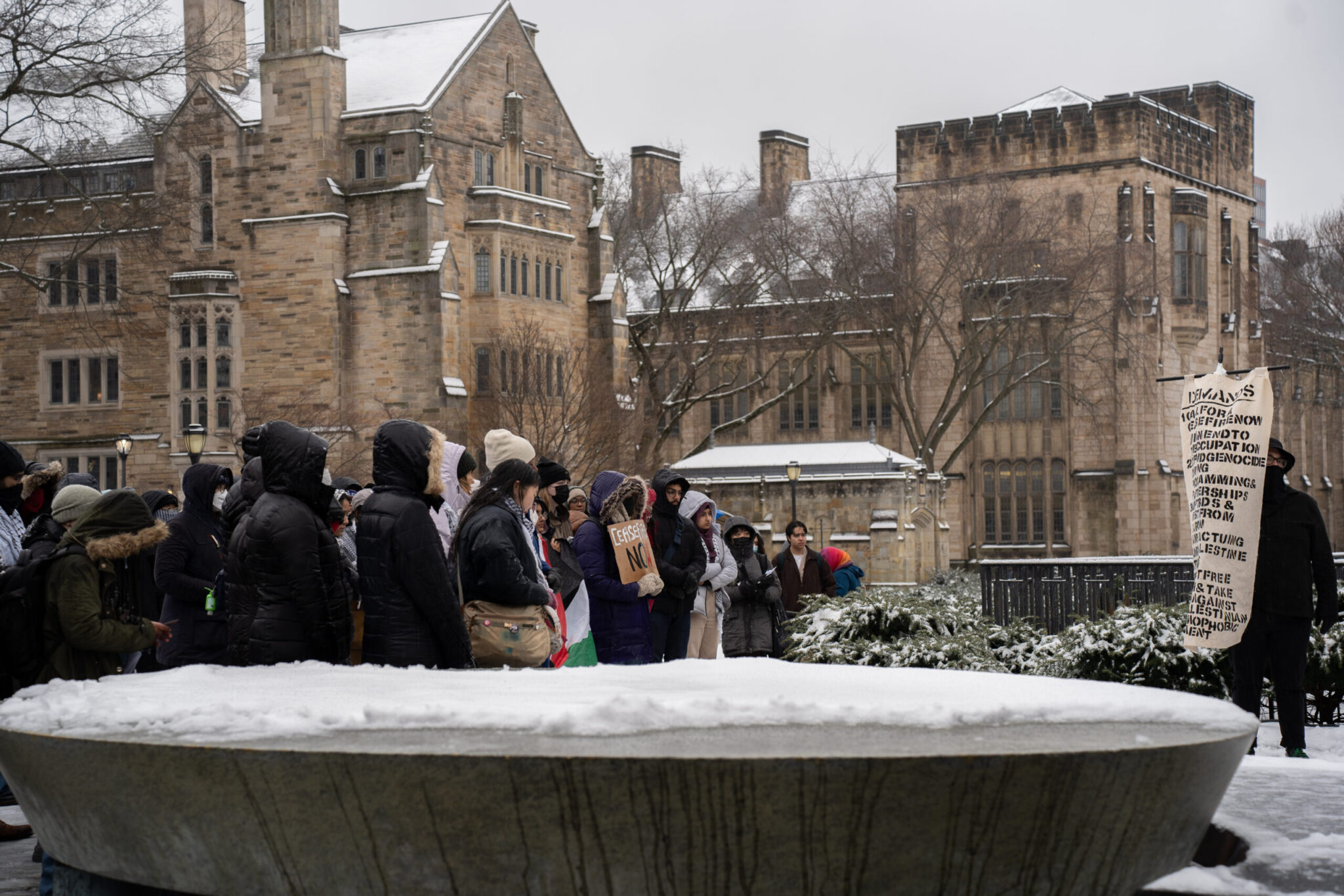
Ellie Park, Photography Editor
On the first day of spring classes — Tuesday, Jan. 16 — students gathered at noon in cold and snowy weather for a “There is No Back To School in Gaza” walkout.
Around 200 students surrounded the Women’s Table on Cross Campus during the protest. The event featured speeches by students and professors as well as chants from the crowd denouncing Yale’s “complicity in genocide and war crimes.”
The walkout was promoted in a joint Instagram post by Yalies4Palestine and Yale Law Students for Justice in Palestine.
The post’s caption referenced a statistic, which is from United Nations monitors, that reports the Israeli military offensive to have damaged over 70 percent of schools in Gaza. The Associated Press reported last week that Israel’s military campaign in Gaza is among the deadliest and most destructive in recent history.
“As Yale students return to campus, we are walking out of classes, recognizing that there is no back-to-school in Gaza…” the post read. “There will be no business as usual as long as Gaza is under siege.”
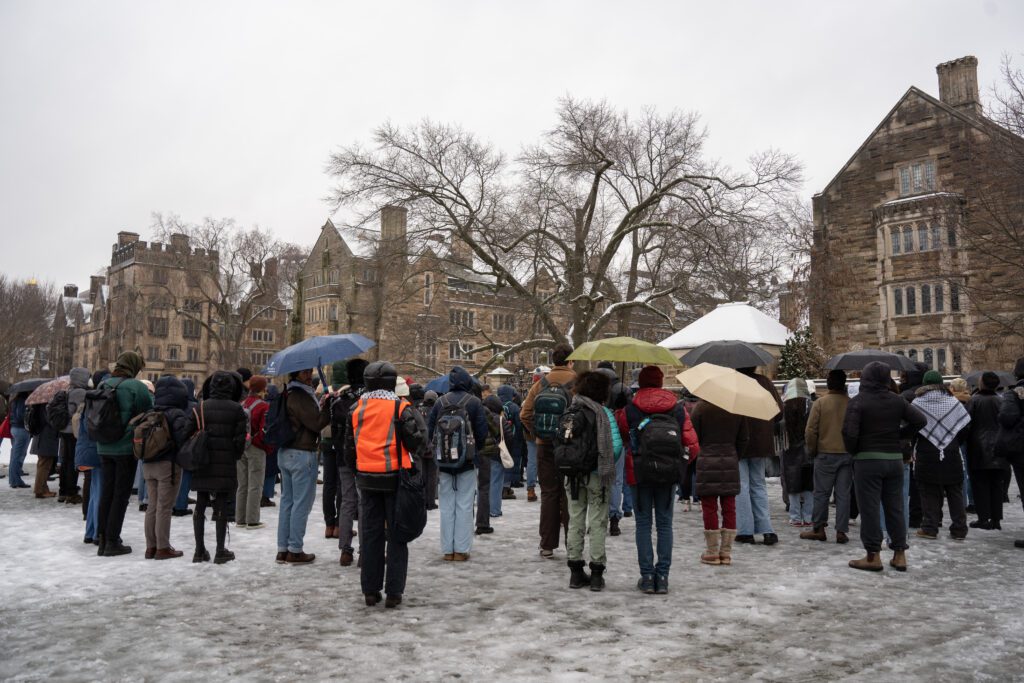
The protest follows months of student activism related to the Israel-Hamas war. On Oct. 7, Hamas launched a surprise attack on Israel, in which Hamas killed at least 1,200 people and took 250 people as hostages, according to Israel’s Foreign Ministry. Israel responded to the attack with a declaration of war and full bombardment of Gaza. Israel has killed more than 24,000 people in Gaza through its military onslaught, Palestinian authorities said earlier this week.
The walkout, which marks the first student protest of the semester, also took place the day following Martin Luther King Jr. Day, with one speaker describing an alignment between King’s work and the goals of the walkout.
“We stand resolute in the tradition of Martin Luther King Jr. and Mahatma Gandhi in speaking truth to power,” a speaker at the walkout said to the crowd. “Violence only begets more violence. It creates a cycle that can seem never-ending, but it must end. And when we look beyond our differences to reach that common humanity it will end.”
The protest grew in size after noon, and students stood with flags and posters. One sign read “Demands” with a list of points, including “Call for Ceasefire Now,” “Fund Palestine Studies” and “Defund Genocide-Denying Programming and Partnerships.” Chants included “Down, down, down with occupation; up, up, up with liberation,” “From Turtle Island to Palestine, occupation is a crime” and “Apartheid kills; Yale pays the bills.”
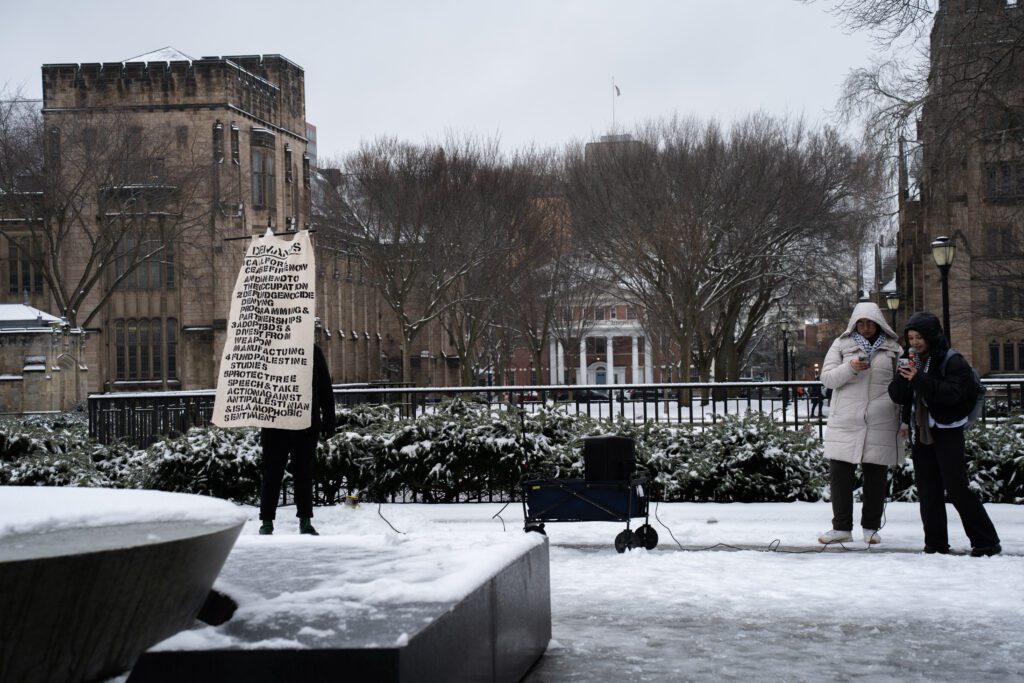
Fareed Salmon ’27 attended the protest to stand in solidarity with Gaza. Salmon told the News that he thinks the Israeli attacks on Gaza have been unfair to Palestinians.
He also added that this Saturday, which was a global day of protest in support of Palestine, motivated his attendance at the protest.
“I’m here today because I don’t think I’ve been as involved as I wanted to be in this effort,” he told the News. “I’m Muslim, so this is a very important topic and thing for me.”
Organizers of the event declined to comment and directed the News to the student who was in charge of press for the event. This press liaison declined to comment to the News and insisted that the News stop interviewing protest attendees.
In a separate joint post, dated the morning of the protest, the two student groups — Yalies4Palestine and Yale Law Students for Justice in Palestine — provided a list of ‘do’s and don’ts’ for the rally were provided, along with a list of demands directed at Yale. The suggestions for students included reading a statement before walking out of their classes and informing their professors of their desire to read a statement ahead of time. The list of don’ts included a “DON’T speak to the press” line, advising students to instead direct press to a “designated press liaison” or a “marshal.”
The press liaison directed the News to a copy of the Yale Palestinian Solidarity Coalition’s press release explaining the goals of the protest which is dated Jan. 16.
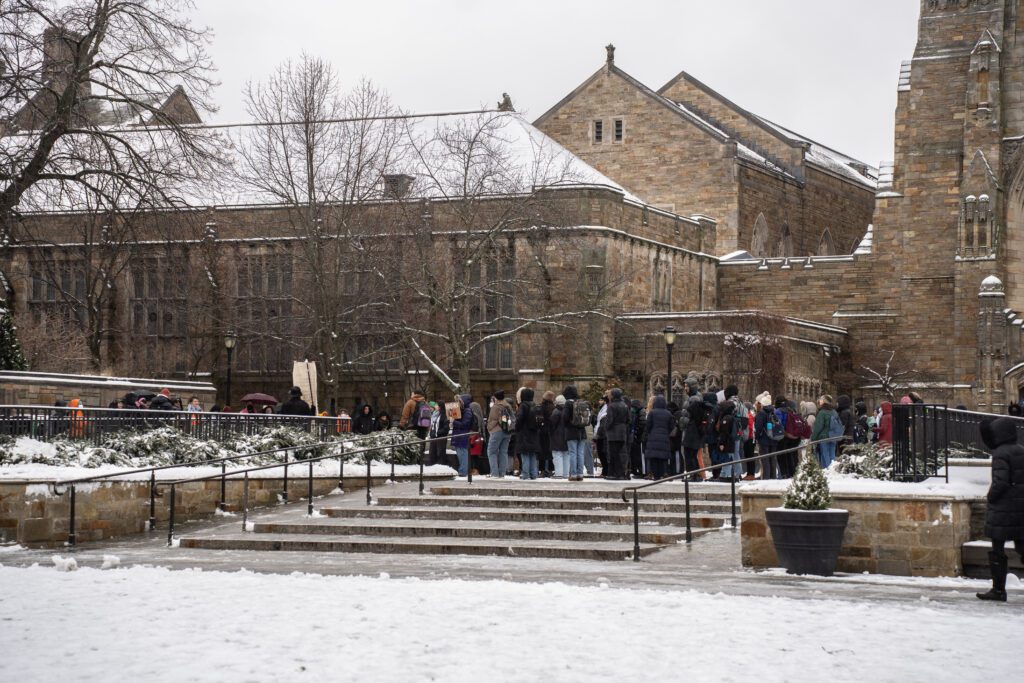
The press release outlines five demands directed at the Yale administration: public support by the University for “a ceasefire and an end to the occupation,” the suspension of “all genocide-denying programming and partnerships,” the implementation of boycott, divestment and sanctions in investment policy and divestment from weapons manufacturing, support for Palestinian studies and scholars and the protection of freedom of expression on campus while acting “against anti-Palestinian and Islamophobic harassment.”
Many of these issues have remained a source of student concern over the past months, particularly student safety on campus and divestment from weapons manufacturing. Student safety concerns grew in November with the arrival of ‘doxxing trucks’ on campus which displayed the faces of students with the label “Yale’s Leading Antisemites.”
The press release specifically references an incident in October in which a student wrote “Death to Palestine” on a whiteboard outside a Grace Hopper College suite. In response, Head of Grace Hopper Julia Adams emphasized Yale’s commitment to “academic freedom” — a reaction the press release deems a “double standard.”
The press release also mentions University President Peter Salovey specifically, noting that despite having spoken out against Russia’s invasion of Ukraine, Salovey has not spoken out against Israel. The press release calls on Yale to refuse business and collaboration with Israeli universities.
In his initial Oct. 10 statement following Hamas’ Oct. 7 attack, Salovey condemned the attacks in the “strongest terms”
In Salovey’s “remarks on compassion and civility,” on Nov. 3 he noted that there are “waves of hatred” toward Jewish, Muslim, Israeli and Palestinian people and emphasized that antisemitism and Islamophobia are “empathetically against” the University’s values.
Salovey’s statement about the Russia-Ukraine War in March 2022 detailed Yale’s support for Ukrainian scholars and students, academic collaboration with Ukraine and stated that the University and the Investments Office support companies who stand with Ukraine.
“His reluctance to name Israel — as he named Russia — as the perpetrator of countless war crimes and the most intense bombing campaign in modern history” suggests “racist double standards,” the press release states.
The press release references Yale’s history of divesting from companies that provided assistance to the perpetrators of the genocide in Sudan in 2006.
The press release also raises concerns over Yale’s response to public safety issues and cites Salovey’s Nov. 3 message, which states that Yale Public Safety has “worked with the FBI and other agencies on campus safety.”
The press release further accuses Salovey of “collusion” in working with the FBI to monitor campus safety, which the release says “perpetrates a climate of surveillance and criminalization of solidarity with Palestine.”
According to the press release, “variations of these demands” have been sent to the Yale administration by members of the Yale community, but did not receive any acknowledgment or response from administrators.
These demands include a letter on Nov. 2 and a follow-up letter on Nov. 20th, which, according to the statement, Yale administration “refused to acknowledge.”
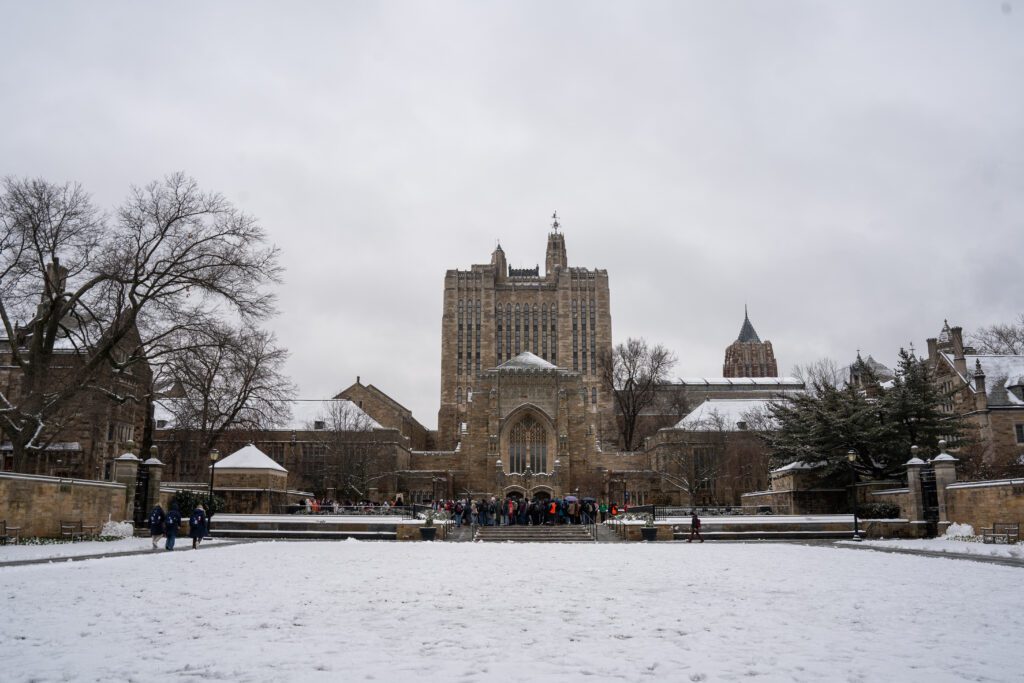
In response to questions from the News, the University spokesperson referred to Salovey’s Dec. 7 statement called “Against Hatred.” The statement urges “open exchange of ideas” and points students toward resources for safety and mental health support. In the same statement, Salovey also announced new educational programming on Islamophobia, a designated space for Middle Eastern and North African students — seemingly in response to years of student advocacy in support of a separate MENA-designated cultural space— and the hiring of a second Muslim chaplain. Salovey also announced a new standing committee to address the needs of MENA and Muslim students.
“Students in Palestine cannot go back to school, so that was the reason for the protest. That is why I thought it was important and necessary [to come to the protest],” Freddie Swindal, a New Haven resident who attended Tuesday’s walkout and demonstration, told the News.
Yalies4Palestine has since posted information about a “week of reading for Palestine” slated for this week.







